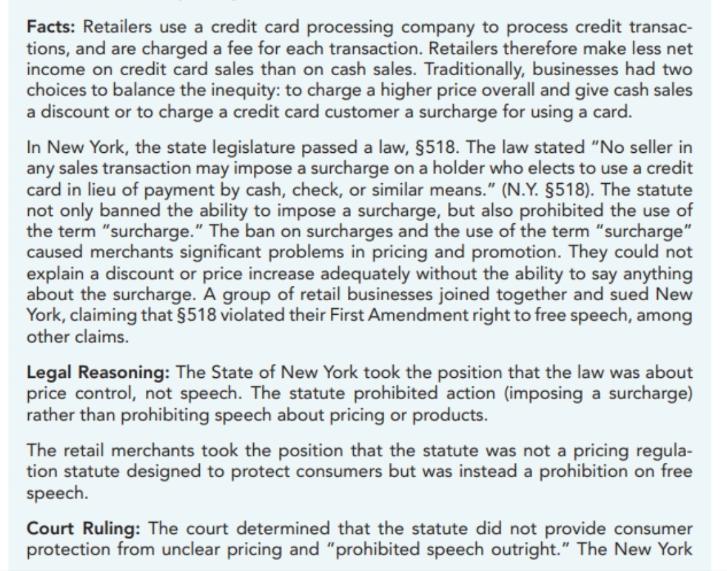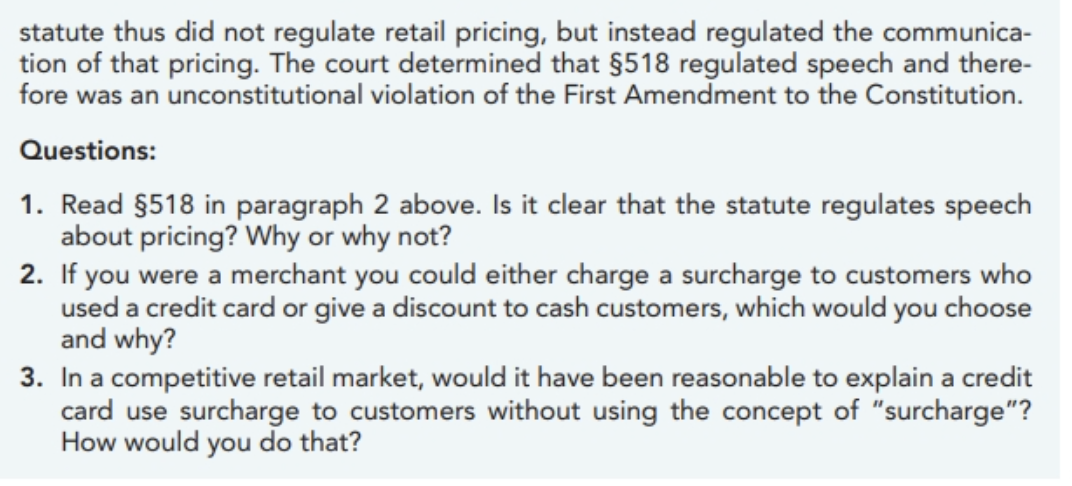Answered step by step
Verified Expert Solution
Question
1 Approved Answer
Facts: Retailers use a credit card processing company to process credit transac- tions, and are charged a fee for each transaction. Retailers therefore make


Facts: Retailers use a credit card processing company to process credit transac- tions, and are charged a fee for each transaction. Retailers therefore make less net income on credit card sales than on cash sales. Traditionally, businesses had two choices to balance the inequity: to charge a higher price overall and give cash sales a discount or to charge a credit card customer a surcharge for using a card. In New York, the state legislature passed a law, 518. The law stated "No seller in any sales transaction may impose a surcharge on a holder who elects to use a credit card in lieu of payment by cash, check, or similar means." (N.Y. 518). The statute not only banned the ability to impose a surcharge, but also prohibited the use of the term "surcharge." The ban on surcharges and the use of the term "surcharge" caused merchants significant problems in pricing and promotion. They could not explain a discount or price increase adequately without the ability to say anything about the surcharge. A group of retail businesses joined together and sued New York, claiming that $518 violated their First Amendment right to free speech, among other claims. Legal Reasoning: The State of New York took the position that the law was about price control, not speech. The statute prohibited action (imposing a surcharge) rather than prohibiting speech about pricing or products. The retail merchants took the position that the statute was not a pricing regula- tion statute designed to protect consumers but was instead a prohibition on free speech. Court Ruling: The court determined that the statute did not provide consumer protection from unclear pricing and "prohibited speech outright." The New York statute thus did not regulate retail pricing, but instead regulated the communica- tion of that pricing. The court determined that $518 regulated speech and there- fore was an unconstitutional violation of the First Amendment to the Constitution. Questions: 1. Read 518 in paragraph 2 above. Is it clear that the statute regulates speech about pricing? Why or why not? 2. If you were a merchant you could either charge a surcharge to customers who used a credit card or give a discount to cash customers, which would you choose and why? 3. In a competitive retail market, would it have been reasonable to explain a credit card use surcharge to customers without using the concept of "surcharge"? How would you do that?
Step by Step Solution
There are 3 Steps involved in it
Step: 1
1 Based on the provided information it is not explicitly clear from the text of 518 whether the statute regulates speech about pricing The statute itself states that No seller in any sales transaction ...
Get Instant Access to Expert-Tailored Solutions
See step-by-step solutions with expert insights and AI powered tools for academic success
Step: 2

Step: 3

Ace Your Homework with AI
Get the answers you need in no time with our AI-driven, step-by-step assistance
Get Started


